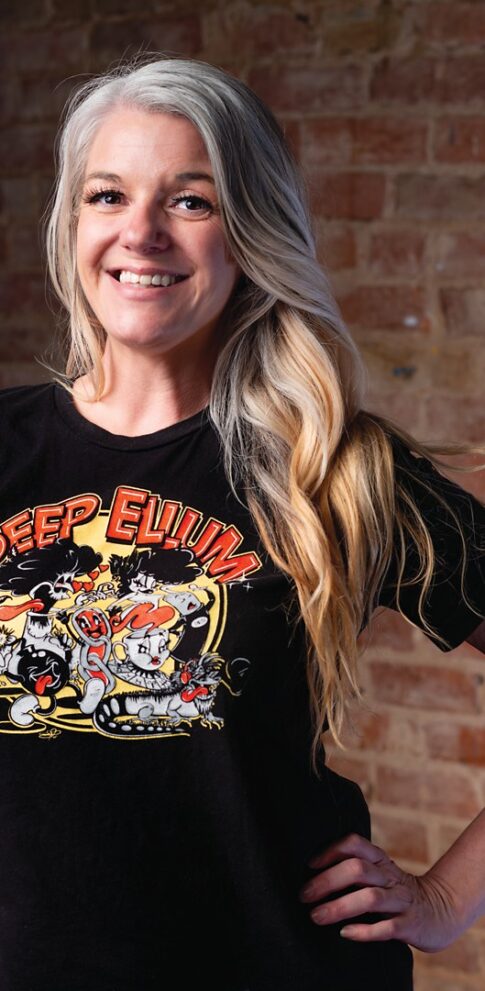
By Taylor Adams Cogan
Callie Dee knows a successful musician needs more than talent. They can pour all of their time and effort into becoming a great musician, but to really cut it, they need the whole picture of entrepreneurship.
It’s why she published a 350-page book last year devoted to independent artists—an effort she pursued after a foundation in accounting and a life devoted to live music.
She started in Fort Worth, but as she gravitated toward hip hop, she kept getting drawn to Dallas. Her first stop was promoting shows at the former Crown and Harp on Lower Greenville. When it closed, she followed the music to Deep Ellum, booking stages at RBC and Club Dada.
“Right before Deep Ellum had its last boom, it was super full of creatives. We only had two streets at that moment of stuff happening, and I feel like the creatives ran the area,” she says.
By 2012, she’d already started hosting shows with different artists – Leon Bridges was on her first couple of events. Deep Ellum gave her a home base, but she knew how to hustle across the Metroplex.
“As a music promoter, Fort Worth and Denton have their own scenes, but to get a bigger bang for your buck, you need Dallas,” she says. “People from Fort Worth and Denton will drive to Dallas. Fort Worth doesn’t go to Denton; Denton doesn’t go to Fort Worth; and Dallas doesn’t want to go anywhere.”
That didn’t stop her from building bridges. She kept work flowing beyond Dallas, which she believes is why she found success so quickly.
“Each one of them has their own little scene, and I found myself becoming a part of each one of them,” she says.
In 2016, she launched Master of the Mics, a hip hop competition where artists would represent—and battle for—their cities.
“I was listening to the radio, and they were talking about the college bracket, and I was thinking it would be kind of cool to do a bracket-type event for every city and then have people compete,” she says.
The contests relied on both fan favorites and judges—and she managed to bring in big names like Erykah Badu. The first judging event was at Trees, and Callie wasn’t sure how she’d ever top it.
But she did, keeping the competition alive until its final run, which was live streamed during the COVID-19 quarantine.
“It was kind of interesting—I had to learn how to live stream and make audio good,” she says. “I was also working with a record label out of Denton, did a couple of tours, and then the pandemic made everything weird. I didn’t know where I fit in anymore in this space.”
Even with her success, she found promoting to be exhausting.
”It’s a gamble. You don’t know if you’re going to make money or lose money half the time; it’s tough,” she says. “I didn’t want to do that anymore.”
So she shifted gears, finding both work and fulfillment at Blackwood Studios, a well-known independent record label, and at the Deep Ellum Community Association, where she put her accounting skills to work supporting the art fair.
At the same time, she built a talent agency to uplift a wide range of artists—and not just musicians.
”I work with all kinds of artists – a folk singer, magician, sexologist, a dance crew, a jazz soul line dancer, a rapper that raps about algebraic equations,” she says.
Still, she knew most musicians couldn’t afford to hire someone like her. That’s what pushed her to write The Indie Artist’s Guide to the Industry, a workbook that puts her decade of knowledge into the hands of independent artists.
”It follows the artist’s journey: How do you choose a name, brand cohesion, social media, figuring out where your brand aligns, recording, going to open mics, equipment at home, writing an email to get a gig, following up on email,” she says. “I didn’t really expect to write about this, but I don’t know how else to put all the things I’ve learned over the last 10 years into a product.”
Now, artists can tap into Callie’s expertise in a more accessible way. And that’s the through-line in all of her work: she wants independent artists to be seen, to be heard, and to succeed.
“Even when I have touring acts come through, from LA especially, it’s almost like a place they’ve never seen,” she says. “I just feel like Deep Ellum is like no other place in the United States when it comes to music and entertainment—to be able to park or take the train in and see all different kinds of genres in one night.”
